08/29/18
K-State Current - August 29, 2018
K-State Current is a weekly news update for the Kansas Board of Regents to apprise the Regents on a few of the many successes and achievements made by K-State faculty, staff and students.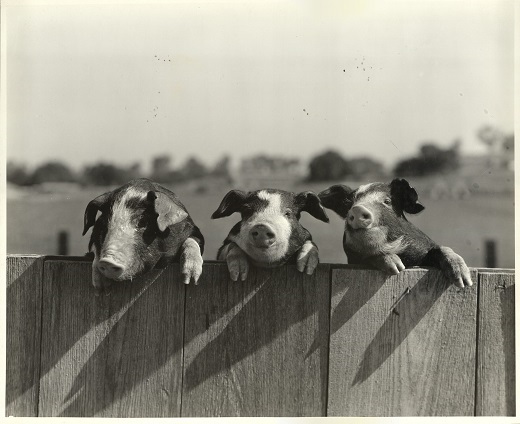
K-State News
Happy mind, happy life: Kansas State University students rank college life high in Princeton Review
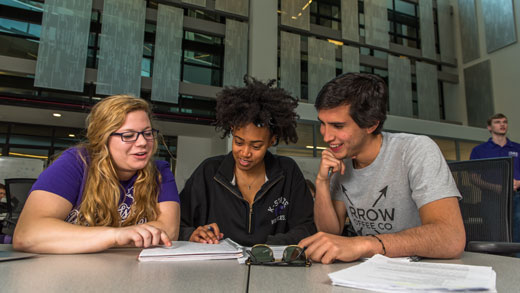
The Kansas State University student experience is among the top in the nation, according to the national student-survey published by The Princeton Review.
"The Best 384 Colleges," a survey of more than 137,000 college students, lists Kansas State University students' rankings as No. 3 for great town-gown relations; No. 4 for best quality of life; No. 6 for best athletic facilities; No. 7 for best health services; and No. 8 for happiest students.
"The Princeton Review rankings show why K-State is the best value in the state and one of the best college buys in the nation," said Pat Bosco, vice president for student life and dean of students. "K-State students enjoy one of the best undergraduate experiences in the nation, a 95 percent placement rate, student loan debt below the national average and the top average starting salaries in the state. Year after year, we celebrate more quality Top 10 rankings from this survey — including one of the happiest student bodies in the nation — than any other Big 12 school."
The university's postgraduation report showed 95 percent of undergraduates were employed or continuing their education within six months of graduation. In addition, a 2018 study by SmartAsset listed K-State students as garnering the highest starting salaries in Kansas for the fourth year in a row and in 2017, Money magazine named K-State the best tuition value in the state for the second year in a row.
"All of these rankings are a tribute to our professors, academic advisers and student life staff who work tirelessly every single day to help make student success a reality for my students and the families we serve," Bosco said.
As part of the student comments collected by The Princeton Review, students said the "community is extremely important" at Kansas State University, and K-Staters are "down-to-earth and family-oriented" and "consider success in college a very important aspect of their lives." The university also is ranked No. 11 in students pack the stadiums; No. 12 in students love these colleges; No. 14 in best-run colleges; No. 15 in everyone plays intramural sports; and No. 16 in best college dorms.
The Princeton Review survey asks the students to rank schools in 62 categories. The book identifies the Top 20 schools in each category. The Princeton Review is an education services company.
North Campus Corridor project finalist for 2018 University Economic Development Association award

The master plan and progress on the North Campus Corridor project along the north end of the Kansas State University campus are receiving national attention.
The University Economic Development Association, or UEDA, has named the project a finalist in the Place category of its 2018 Awards of Excellence. The category recognizes the many and diverse ways institutions help create attractive, competitive communities
Representatives from the university, the Kansas State University Institute for Commercialization, the Kansas State University Foundation, the city of Manhattan, the Manhattan Area Chamber of Commerce, Riley County and K-State Athletics developed the collaborative North Campus Corridor plan. The project is creating an area for industry to co-locate with the university and the National Bio and Agro-defense Facility, or NBAF. The corridor is designed to support the university's research mission and create value for all.
"The North Campus Corridor will enhance the area’s aesthetics and offer a gathering place for university, the public sector and the private sector," said Richard Myers, president of Kansas State University.
"The plan enables economic development that will guide our efforts and successes for years to come," Myers said.
The North Campus Corridor Master Plan comprises 13 phases to improve access, safety, infrastructure and aesthetics. Phases one through four are underway now. All phases will be complete by the time NBAF becomes operational in 2023.
University and community officials will present at the UEDA Annual Summit in Milwaukee, Wisconsin, in October.
"We're excited to have this opportunity and recognition for a true town-gown partnership that provides essential infrastructure to support economic development," said Linda Morse, mayor of Manhattan.
For more information about the UEDA awards program, visit universityeda.org/.
K-State Faculty Highlight
Kansas State University experts confront looming threat of African swine fever in Asia
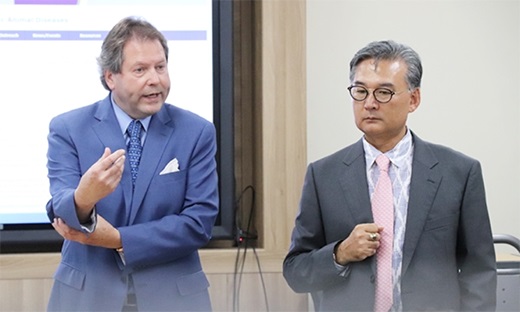
Kansas State University experts are providing guidance to officials in East Asia on the emerging problem of African swine fever.
Jürgen Richt, Regents distinguished professor and director of the university's Center of Excellence for Emerging and Zoonotic Animal Diseases, known as CEEZAD, is an internationally recognized expert on transboundary animal diseases. He was in Asia to deliver a series of presentations when an outbreak of African swine fever was reported in China on Aug. 1. A second outbreak was reported on Aug. 16, and a third on Aug. 19.
African swine fever is a highly contagious disease of domestic pigs and wild boar. The disease causes high fever, respiratory problems, weakness, and stillbirths. The economic consequences for the pork production industry are grim: Mortality rates among affected animals approach 100 percent. More than 8,000 pigs were culled in response to the initial outbreak, according to news reports.
"Efforts to handle a potential outbreak have not succeeded, so we have to be concerned about the disease spreading across national boundaries," Richt said. "The first outbreak occurred only a little more than 120 miles north of North Korea."
Richt spoke with veterinary medicine faculty and students at Konkuk University in Seoul, South Korea, and with members of South Korean media and swine associations. He said South Korea is not well prepared to handle the outbreak and that the country is working to improve its emergency procedures. Containing the disease is particularly difficult because it tends to spread via wild boars.
Richt also discussed the challenges facing those trying to develop vaccines for African swine fever. CEEZAD is actively involved in the effort to produce mitigation strategies to control African swine fever and to develop vaccines.
Young Lyoo, dean of the Konkuk University College of Veterinary Medicine, said Richt's information will help provide a front line of defense to save a major industry and protect a valuable protein source.
"Dr. Richt provided not only expert knowledge and opinion on the disease and a control, but also disseminated awareness to the public, government and industry through media exposure," Lyoo said. "His visit showed how important international cooperation is to fight against contagious transboundary disease."
Richt said the disease presents trade problems for China and other Asian countries. China produces nearly half the world's pork.
"African swine fever is a threat to world trade in the pork industry, which will ultimately affect western Europe, the United States and other trade partners," he said.
Stephen Higgs, director of Kansas State University's Biosecurity Research Institute, and Wenjun Ma, associate professor of diagnostic medicine and pathobiology at the university's College of Veterinary Medicine, also traveled to China to give invited talks at the Conference on Animal Infectious Diseases and Human Health jointly conducted by the Chinese Association of Animal Science and Veterinary Medicine and the Chinese Society for Immunology in Harbin, China. Higgs described work at the Biosecurity Research Institute, Richt presented a lecture on Rift Valley fever virus, and Ma discussed his work on bat influenza viruses.
Higgs said the invitations indicate international respect for Kansas State University research in infectious disease and biodefense.
"Our facilities and experts are second to none," Higgs said. "We are keeping a close eye on disease outbreaks around the world and maintaining a rigorous research program to defend against economically devastating livestock diseases."
"Fundamental science questions about diseases like African swine fever can only be addressed in the unique facilities we have by the talented faculty, students and staff at K-State," said Peter Dorhout, the university's vice president for research. "Our land-grant university heritage and mission align perfectly with how Professor Richt and his team apply their new knowledge about African swine fever to help protect the world's food supply and a critical agricultural industry."
K-State Student News
Making a splash: Kansas State University team scores high in fountain wars competition
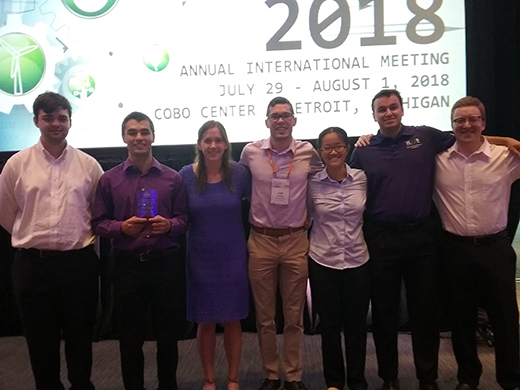
Six members of the Kansas State University Fountain Wars Team, a creative design team from the College of Engineering, brought home third-place honors in a recent international competition.
It's the seventh time in past eight years a team from Kansas State University has finished in the top three in the Fountain Wars Competition, a segment of the G.B. Gunlogson Student Environmental Design Competition.
The outdoor event is a hands-on, real-time design contest in which students construct and model their entry before the American Society of Agricultural and Biological Engineering's annual international meeting, this year July 29-Aug. 1 in Detroit.
Awards are based on combined scores of written report, video abstract, oral presentation, construction, technical tasks and an aesthetic display. In honor of the meeting location in "Motor City," the Kansas State University team incorporated the iconic Chevrolet Bel Air as the aesthetic component of its fountain. This year's technical tasks included launching a golf disc at a target and balancing a beam following placement of a weight by the judges at the contest.
The team, advised by Trisha Moore, assistant professor of biological and agricultural engineering, received a cash prize and trophy for its entry in the competition.
The following students made up the 2018 Fountain Wars Team:
Joe Boutte, junior in computer science, and Caleb Jones, junior in biosystems engineering, both from Colwich; T-Ying Lin, junior in mechanical engineering, Kansas City; Evan Morrical, junior in biosystems engineering, Salina; Devon Bandad, graduate student in biological and agricultural engineering, Teddy Gillespie, junior in biological systems engineering, Charlie Hamilton, junior in electrical engineering, and Jessica Stanton, junior in biosystems engineering, all from Shawnee; and Alexander Coon, senior in biosystems engineering, Wichita.
From out of state: John Pittala, junior in mechanical engineering, Kansas City, Missouri.
When a federal laboratory comes to town, it fuels demand for highly educated and trained workers.
Kansas State University is helping meet that demand. Five graduate students from the College of Veterinary Medicine have been awarded National Bio and Agro-defense Facility Scientist Training Program fellowships. The awardees will receive tuition, stipends and funds for supplies and travel through a $1.6 million cooperative agreement with the U.S. Department of Agriculture's Animal and Plant Health Inspection Service.
Fellowship awardees were selected for their strong interest and expertise in emerging animal diseases, diseases that infect both animals and people, or foreign animal diseases that threaten global health and food security. Once they complete the fellowship program, they are committed to working at the Foreign Animal Disease Diagnostic Laboratory at the Plum Island Animal Disease Center in New York and, ultimately, the National Bio and Agro-defense Facility, or NBAF, which is under construction adjacent to the university's Manhattan campus. The selected students have already received training in high-containment facilities that work with pathogens that will be studied at NBAF.
The fellowship recipients will be mentored by their major professors, with whom they have worked with for at least one to three years, as well with Animal and Plant Health Inspection Service-Foreign Animal Disease Diagnostic Laboratory scientists with subject matter expertise in the identified program areas.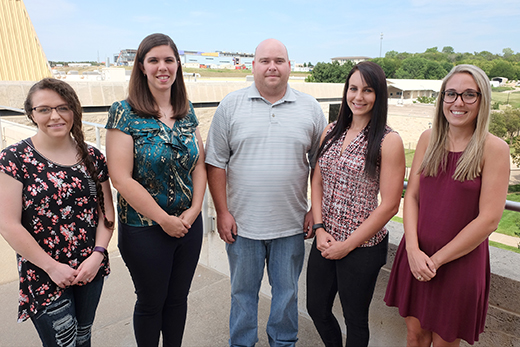
The following students are recipients of the NBAF Scientist Training Program fellowships:
- Kaitlynn Bradshaw, master's student in veterinary biomedical science, Hill City. Her mentor is Sally Davis, assistant professor of diagnostic medicine and pathobiology.
- Chester McDowell, concurrent Doctor of Veterinary Medicine and doctoral student in diagnostic medicine and pathobiology, Corrales, New Mexico. His mentor is Juergen Richt, Regents distinguished professor of diagnostic medicine and pathobiology, Kansas Bioscience Authority eminent scholar and director of the U.S. Department of Homeland Security Center of Excellence for Emerging and Zoonotic Animal Diseases
- Laura Constance, concurrent Doctor of Veterinary Medicine and doctoral student in diagnostic medicine and pathobiology, Clyde, North Carolina. Her mentors are Bob Rowland, professor, and Megan Niederwerder, assistant professor, both of diagnostic medicine and pathobiology.
- Victoria Ayers, doctoral student in diagnostic medicine and pathobiology, Prague, Oklahoma. Her mentor is Dana Vanlandingham, associate professor of diagnostic medicine and pathobiology.
- Christian Cook, doctoral student in diagnostic medicine and pathobiology, Fort Worth, Texas. Her mentor is Dana Vanlandingham, associate professor of diagnostic medicine and pathobiology.
Beth Montelone, senior associate vice president for research at Kansas State University, said the fellowships are an effort to train future research scientists, veterinarians and research technicians. Other students in the inaugural fellowship class are graduate students at Iowa State University and Mississippi State University. The program will expand next year to include applicants from other universities.
"K-State is very excited to partner with USDA APHIS on training the new generation of front-line researchers on transboundary animal diseases who will be working in the NBAF," Montelone said. "It is a great commentary on the strengths of our research and graduate educational programs that five of our students have been selected to participate in the first cohort of NBAF Scientist Training Program fellowships fellows."
The fellowships provide funding to cover tuition and fees, as well as an annual stipend, health benefits and funds for materials and supplies, travel and publication costs to further their research. A total of five years of funding is available for the concurrent Doctor of Veterinary Medicine and doctoral students; up to four years for doctoral students; and three years for master's-level students.
Carol Shanklin, dean of Kansas State University's Graduate School, said the NBAF Scientist Training Program provides an excellent opportunity for the recipients to gain valuable knowledge and skills while preparing them for scientific careers in national laboratories, including NBAF.
"Preparing graduate students to meet the specialized needs of both U.S. and international workforces is an essential role of graduate education," Shanklin said. "I look forward to working with the five recipients and their mentors to assure the success of the program."
Frank Blecha, associate dean for research at the College of Veterinary Medicine, said the college supports efforts to provide qualified staff for NBAF and other facilities that require agro- and biodefense expertise.
"The NBAF Scientist Training Program fellowship is a career-changing opportunity for selected students," Blecha said. "These students planned their graduate and professional programs to gain research and diagnostic expertise to work on select agents in high-containment facilities with the hope that there would be positions available when they graduate. We are fortunate that USDA APHIS, the university and the college invested in the personnel and infrastructure that will help them reach their goals."
The fellowship opportunities will be offered again in fiscal year 2019. More information about the program is available at k-state.edu/research/opportunities/NSTP.html.